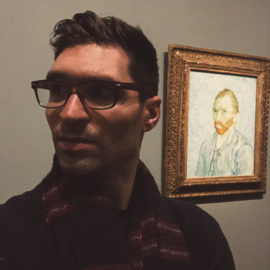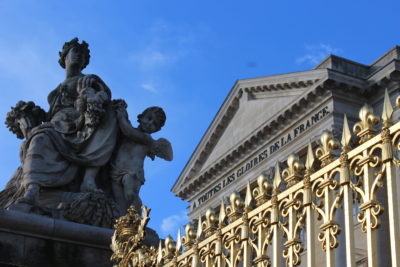Rich Conversations: 020. Thoughts on Paris
Show notes from episode 020 of Rich Conversations: Thoughts on Paris.
I’m back and settled in from my trip to Paris. There’s so much to digest, including my phone getting stolen on the Metro.
First, I’ve always wanted to visit Paris. There’s a handful of places I absolutely want to go to because of their massive role in Western Civilization: Rome, Athens, Florence, London, Paris, Berlin, Amsterdam, Cairo. We always say we’re going to get around to it and then the years pass us by.
As you’re aware, I’m a big Bucks fan and Giannis follower. If you want an explanation why, listen to Episode 16 of this podcast: Greek Philosopher Giannis Antetokounmpo. It was announced they’d participate in the first ever NBA game in France. I booked my flight in late August. If I was ever looking for a reason or opportunity to go, this was it.
 Besides the game, there were a few things in particular that interested me. I really wanted to visit the Museum d’Orsay. It’s an old train station converted into a museum that houses mainly impressionist works and art from the late nineteenth century. The story of the Impressionists and post-impressionists absolutely fascinates me. In a book a read, I stumbled upon Dear Theo, the autobiography of Vincent Van Gogh—actually they’re his letters to his brother. They’re quite beautiful and inspiring. Since reading it, I’ve added an item to my 50 before 50 list: take a photo with every publicly displayed Van Gogh self-portrait in the world. There are six in the United States, of which I’ve accomplished three so far—in New York, D.C., and Chicago. The Museum d’Orsay displays two of the paintings.
Besides the game, there were a few things in particular that interested me. I really wanted to visit the Museum d’Orsay. It’s an old train station converted into a museum that houses mainly impressionist works and art from the late nineteenth century. The story of the Impressionists and post-impressionists absolutely fascinates me. In a book a read, I stumbled upon Dear Theo, the autobiography of Vincent Van Gogh—actually they’re his letters to his brother. They’re quite beautiful and inspiring. Since reading it, I’ve added an item to my 50 before 50 list: take a photo with every publicly displayed Van Gogh self-portrait in the world. There are six in the United States, of which I’ve accomplished three so far—in New York, D.C., and Chicago. The Museum d’Orsay displays two of the paintings.
The Impressionists were these group of painters that used short brush strokes and vague pictures to capture the essence of the subject. Unlike the popular art at the time, they painted nature and regular life scenes. These artists were looked down on in Paris. Critics trashed their work.
Durand-Ruel was an impressionist art dealer. He would try to sell their paintings around Europe with no avail—going broke several times in the process. To his excitement, it now only took one week to cross the Atlantic. Can you believe that? It only took me eight hours!? He only brought a handful of impressionist paintings with him and a ton of what was considered popular and mainstream.
America, at this time, was quickly becoming the most powerful and industrious country in the world. It was prosperous and ambitious. Unlike Europe, they didn’t care about the old. The Americans wanted something new—something to make a statement. This bold nation wanted to set its own mark in art. They wanted more of this Impressionist stuff. You got more of it? We’ll take all of it! Boom! Off we go and you can make the argument that modern art stems from the impressionism movement.
The Museum d’Orsay was pretty cool. I enjoyed that. The building itself is super neat.
I can see why people say they fell in love with Paris. I didn’t fall in love with it. I don’t think I like French culture. It’s about enjoying the moment. Pleasure, opulence, and luxury. I imagine it truly began during Louis XIV reign. In addition to gaining power through the military, he intimidated and overwhelmed people with his fashion and flamboyancy. Each year he spent half of France’s GDP building his palace, Versailles. That’s incredible. In order to get close to the king, you had to dress and dine a certain way—only the finest and most luxurious. People on court would literally go into debt to pay for jewelry and dresses to wear at his parties. That culture carried through the years to today. Paris is a fantastic place to vacation for that reason. I consumed nothing but coffee, wine, and pastries. Everything was delicious.

But I couldn’t do that for more than a week. One of the things I wanted to do most was work on my third book over there—not just be inspired but finish it. I just wanted to go to cafes and work. That’s not the culture in Paris. The cafes are tight and filled with people having conversation—don’t get me wrong, I love conversation. I think that says a lot about the difference in cultures. In America, the coffee shops are spacious with big tables, WiFi, and outlets. It was a struggle, but I got it done. Book three is with my editor now. I think that whole situation is reflective again of the Impressionist story—Americans want to push new ideas and work to put them into action—the culture is much more open in that sense.
On that Sunday, I was making my way to the Palace of Versailles on the Metro. I transferred lines and stood in a crowd. I decided I wanted to listen to music. Who doesn’t want to listen to Harry Styles on a late Sunday morning? Until this point, I had been putting my passport, wallet, and phone all in my tight, front jeans pocket. I placed my phone in my loose coat pocket and then reached inside my coat for my headphones. I untangled my headphones, stuck them in my ears, and reached for my phone. It wasn’t there. I patted down all my pockets. Hmm. Interesting. I felt confused more than anything. In life, it’s not the event that affects you, it’s your reaction. My phone was stolen. It happened. Take care of the next steps and move on.
I got off the train, went to a café and used their WiFi to suspend my phone line and change my Apple password. Side note: this place had the best croissant I ever tasted. Next, I walked to the police station and filed a report and then moved on with my day. I felt lighter, more attentive and able to notice and experience Paris.
It’s been a week and a half since it happened. I haven’t been in a hurry to replace the phone. It’s been enjoyable. I’ve been so relaxed and free. I had been reducing my phone use and practicing intention, but Paris removed my training wheels. It’s allowed me to take a step back from life, reflect, and it’s spurred new ideas. Is it strange to be grateful for a thief? The person thought they were taking from me but, instead, they’ve given me something far more valuable than the inconvenience of a stolen phone or the cost to replace that said phone. I don’t need it. I’ve been able to still do everything I need to with my iPad and laptop. I use those purposefully. A phone, on the other hand, is in your pocket at all times—at your disposal. It promises that you’ll never be bored again as long as you give your life to it.
Our phones have incredible tools, that when used intentionally, can bring us tremendous benefits; however, if we’re not careful, we become the tools.